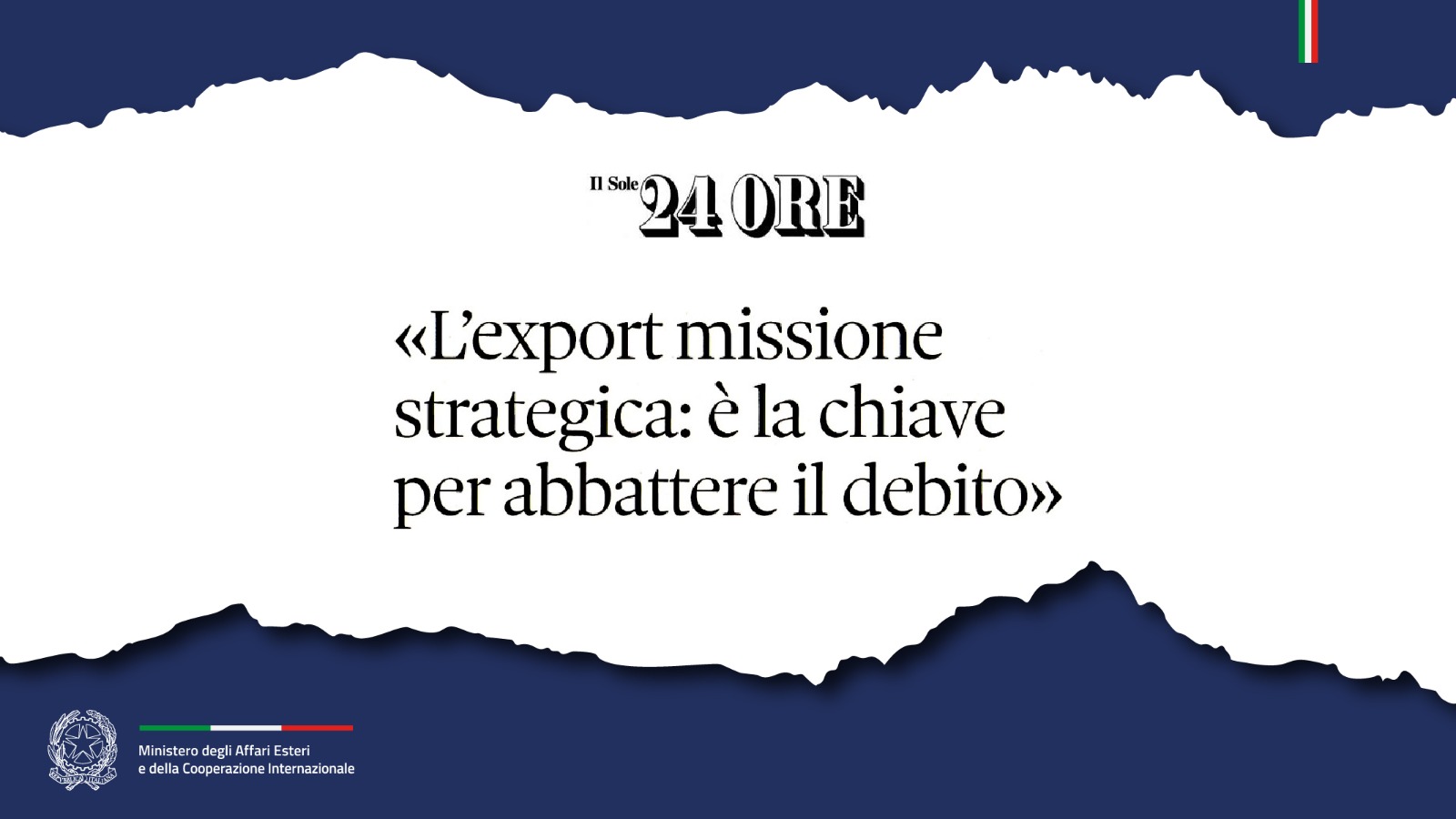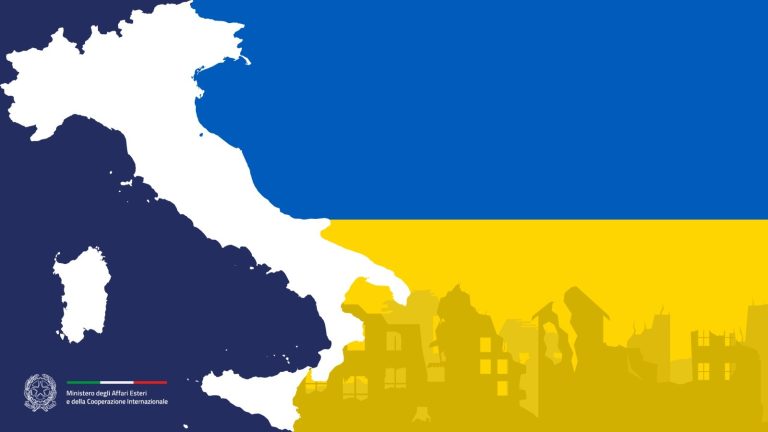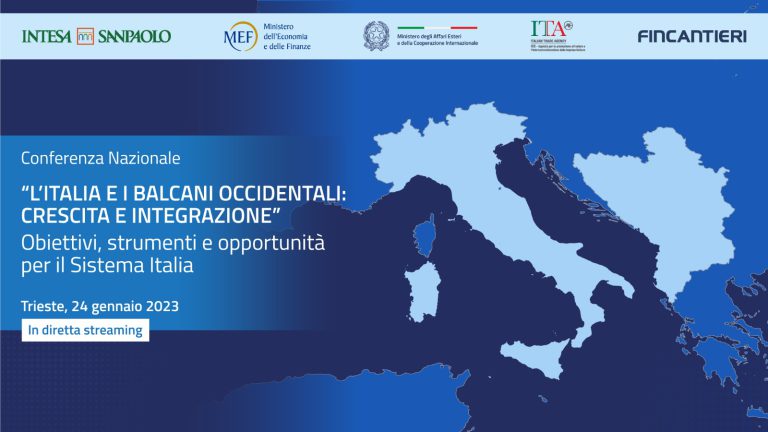Exports are vital for Italy. They play a decisive role in cutting debt, in making the country even more stable and credible both socially and economically. In this economic phase national consumption is decreasing and therefore companies can only compensate with external demand. This is the reason why exports are a strategic mission for us at the Foreign Ministry”.
In an interview with Il Sole 24 Ore, Antonio Tajani, Deputy Prime Minister and Minister for Foreign Affairs, outlines the government policy and the new “diplomacy of growth” of the Farnesina, which has competence and tasks of supervision, direction, and monitoring of Ice-Agenzia and Simest. “Increasing GDP means increasing tax revenues and cutting debt, which is the country’s real deadweight. If an economy works, also thanks to its exports, it generates wealth that increases the country’s social well-being. To implement distributive policies, we must first generate wealth; we cannot “buy” wealth by making new debt. This is the reason why exports must be a primary task of the State and therefore ours at the Foreign Ministry.”.
2022 closes very well for Italian exports.
“In 2022 Italian exports will exceed EUR 600 billion, well above the important target of 2021, although partly as a result of inflation. They account for 30% of the country’s GDP. The Italian productive fabric has become very diversified, and today, besides the traditional sectors of mechanics, fashion, and high-end products, there are increasingly solid realities in exports such as aerospace, pharmaceutical, bio-medical, and precision mechanics sectors”.
The outlook for 2023 points to a slowdown.
«The Italian economy is strong. Out of 5 million companies, as many as 140,000 are exporting companies and Italy has a leading position in many sensitive sectors. This is one of the main assets of Italy’s foreign policy; exports for us are a global game. There is no country in the world where Italy is not present and its products are not high in demand. This is our “oil”.»
Global game means operating in all markets.
“During my term of office, every aspect of Italy’s foreign policy and of the Ministry I lead will be guided by this vision. We are a manufacturing country, we need markets – as free as possible – from which to import raw materials and markets to which our exports can be directed.”
Are there anyway priorities that correspond to the government’s “political” objectives?
“Strengthening the diplomacy of growth throughout the Neighbourhood. The Balkans and Africa. I was with Minister Crosetto in the Balkans. In early 2023 we will convene several business forums, starting with Belgrade and Pristina. A process that I see connected to the reconstruction of Ukraine, when the conflict ends. On 24 January 2023 I will promote with the government a national Conference on the Balkans in Trieste, entirely dedicated to our overall strategy.”
Then the Mediterranean and Africa: both Prime Minister Giorgia Meloni and you have spoken of comprehensive plans.
“Africa is central to the whole world, and even more so to Italy, which is at the centre of the Mediterranean. We must strengthen the presence of Italian companies in the Sub-Saharan African countries which have good growth prospects. But above all we aim at Africa’s development in a logic of collaboration, not exploitation.”
Africa, rich in raw materials…
“Of course, but we want to operate not only to extract precious materials, such as rare earth elements or lithium, but also with joint ventures with the Africans, so as to contribute to the growth of a ruling class in the countries that we can perhaps train in Italy, in our universities. This will be a strong theme of the next Ambassadors’ Conference that we will organise next week at the Farnesina.”
There are areas in the world with huge potential that sometimes seem a little forgotten.
“First of all Latin America, where there are largest communities of Italian origin. For us, it is the entire American continent that must be central. In San Francisco my Ministry, in collaboration with Ice, has activated the first “Italian Innovation and Culture Hub” in 2022, an initiative following up the visit paid by the President of the Republic, Sergio Mattarella, to the Silicon Valley in 2019. An initiative that could be replicated in Tel Aviv and Shanghai.”
Then there is the unknown factor-China, defined by the EU as a “systemic rival”.
“The objective is always to develop trade relations, but in light of a relationship that must certainly take into account our national interests, starting with the unfair competition that is sometimes practised in certain situations. This process is part of a focus on Asia in a framework of strengthening relations with India, which will chair the G20 this year.”
Minister, you have been working for months to have one of the seats of the Unified Patent Court assigned to Milan.
“Yes, we are working with our European partners, particularly Germany and France, in view of the entry into force of the Unified Patent Court Agreement. Italy is one of the three main European districts of industry and innovation in the EU. It is therefore strategic and economically justified to move the section assigned to London to Milan.”
What strategy do you want your Embassies to follow for promotion? A key theme is therefore Integrated Promotion.
“A strategy that we want to outline to the foreign public. The wisdom, beauty, variety, originality and drive for innovation that have always characterised Italian know-how in the fields of culture, economy, science and technology. But also the promotion of sport. In particular, in view of the important Ryder Golf Cup in September, we will organise promotional initiatives in all our Embassies and Consulates.”
The ECB has just raised interest rates, and you have been critical about this decision.
“The European Central Bank is autonomous in its monetary policy decisions. I have just expressed an opinion: for me it is a mistake at this stage to raise the cost of money for businesses and households. In Europe inflation is related to the huge increase in energy prices, which can be counteracted by the price cap. The situation is different in the United States, where prices are rising because of domestic demand.”
And what about the ESM? You have a slightly different opinion from other government colleagues.
“I have always been in favour of its use, I have reservations about the regulations. The instrument should be under the European Parliament’s control. Mine is a pro-European criticism. But we will find a way for those who want to use it to do so. More than talking relentlessly about the ESM, I would insist on the creation of a European energy and competitiveness Fund, on the model of the National Recovery and Resilience Plan (PNRR), to counterbalance the US Ira Fund that will help US companies from January onwards, to the tune of 370 billion.”




